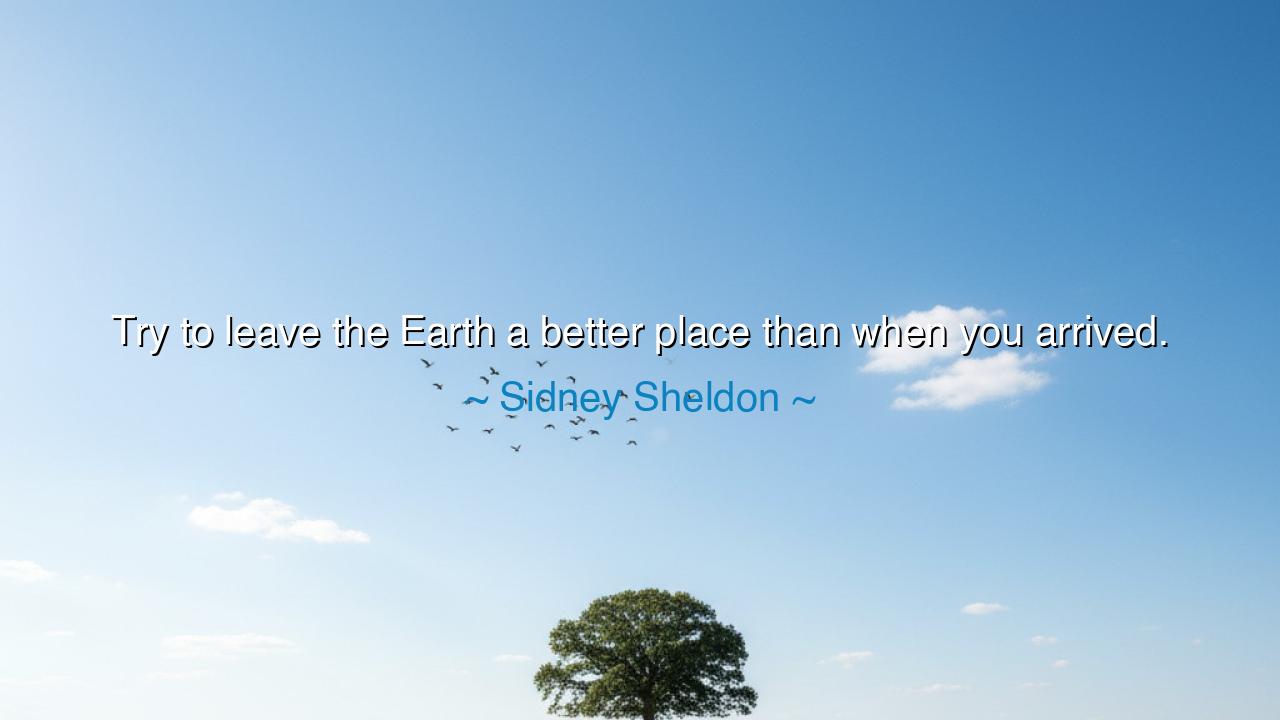
Try to leave the Earth a better place than when you arrived.






There are some sayings that shine like stars — small, simple, but burning with eternal light. Among them are the words of Sidney Sheldon, who said: “Try to leave the Earth a better place than when you arrived.” In this gentle command lies one of the oldest and most sacred truths of humankind: that life is not only a gift to be enjoyed but a trust to be honored. Sheldon’s words speak as both blessing and duty — a call to live with purpose, to build rather than to consume, and to pass on to the generations yet unborn a world made more beautiful by our time upon it.
The meaning of this quote reaches beyond mere morality; it touches the essence of what it means to be truly human. To leave the Earth better is to live in awareness that we are but travelers upon her surface — guests of a host whose patience is great but not infinite. Every tree planted, every kind word spoken, every act of justice or compassion is a stone laid in the temple of the future. The wise do not live only for their own comfort or gain; they labor for those who will follow, knowing that the greatness of a person is measured not by what they take, but by what they give back.
The origin of these words comes from the mind of a man who understood the fleeting nature of success. Sidney Sheldon, celebrated as a writer of novels and screenplays, achieved fame and wealth, yet his reflections reveal a spirit aware of impermanence. In the glittering world of achievement, he saw the deeper truth — that no honor or fortune endures beyond one’s lifetime, but the good we do may echo through centuries. His quote is not born of despair but of enlightenment: that the truest legacy is not carved in marble or written in books, but in the soil we protect and the hearts we uplift.
Consider the life of Mahatma Gandhi, who walked lightly upon the Earth yet moved the hearts of millions. He owned little, desired less, and left behind no monument of gold or empire of stone. Yet through his actions — his truth, his simplicity, his reverence for all life — he indeed left the Earth better than he found it. His spinning wheel became a symbol of dignity; his words became a compass for nations. Such is the power of a life lived in harmony with this teaching: that to serve others is the surest path to immortality.
But Sheldon’s wisdom is not only about great deeds or famous lives. It speaks also to the ordinary and the unseen — the teacher who inspires, the farmer who tends the soil with care, the child who chooses kindness over cruelty. Every person, no matter how small their sphere, has the power to mend a part of the world. The Earth does not ask for perfection, only for gratitude. She does not demand that we save her alone, only that we cease to wound her carelessly. Each of us is a steward, not an owner, and our every action writes a verse in the long poem of creation.
Let these words, then, be a guide for the living: when you speak, let your words heal; when you work, let your labor nurture; when you rest, do so in harmony, not in waste. Leaving the Earth better begins in small acts — recycling a single item, helping a neighbor, protecting a stream, or teaching a child compassion. The smallest goodness multiplies, as ripples in a pond widen into waves. The wise do not wait for grand opportunities; they shape greatness out of the dust of daily life.
So, my children of tomorrow, live as though the world were entrusted to your care — for it is. Build gardens where there was barren ground, spread understanding where there was division, and plant hope where there was despair. When your time upon this Earth is done, may those who walk after you breathe cleaner air, see brighter stars, and speak your name with gratitude. For that is what it means to live nobly — to walk lightly, to act justly, and to leave the Earth better than when you arrived.
And in the end, this is the simplest and most profound of all commandments: do good, love deeply, and leave behind more light than you found. For the world does not remember the wealth of the greedy or the fame of the vain — it remembers the kindness of those who cared. Let that be your monument, your legacy, your eternal gift to the Earth that bore you.






AAdministratorAdministrator
Welcome, honored guests. Please leave a comment, we will respond soon